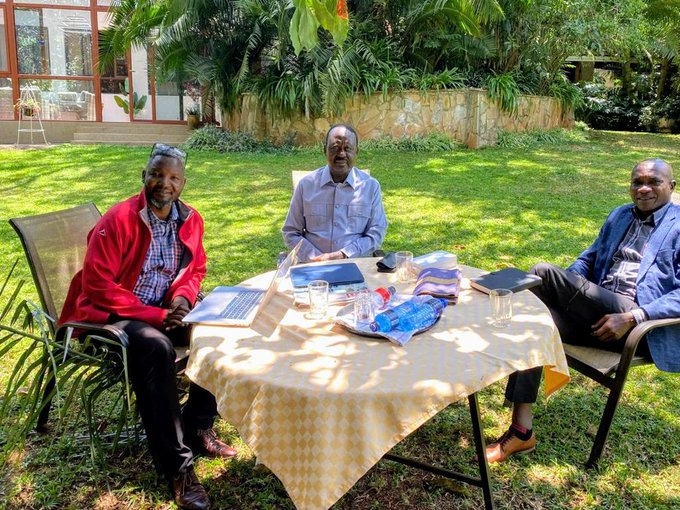Less than a year ago, Nairobi resident Vincent Mweya would spend Sh1,000 on a week's shopping.
He would buy a 400gm loaf of bread at Sh50, a 500ml packet of milk at Sh50, 1litre of cooking oil at Sh245, 2kg packet of maize flour at Sh90 and 2kg of sugar at Sh210.
Now, with a similar weekly budget, Mweya's can barely buy enough for a whole meal.
The prices have gone up to Sh60 for bread, Sh60 for milk and Sh270 for sugar.
Maize flour prices crossed the Sh200 mark for a two-kilo packet last week adding to the plight of the high costs of living.
The 26-year-old vegetable vendor says he is now forced to find new ways to survive, including forgoing meals.
"Because of the high cost of everything, I can only afford two meals a day, sometimes just one good meal and a snack," Mweya told the Star on Monday.
His case resonates with millions of Kenyans who are slashing on basic commodities due to the rising inflation.
Another city resident Anna Ndung'u says she is now spending less on groceries, while mostly avoiding meat, eggs and fish.
"From at least three times to now once a week, meat is becoming a luxury in my home, "Ndung'u told the Star on Monday.
Food vendor Olick Odhiambo said he has seen a reduced number of customers with many citing hard times.
Odhiambo sells food in Westlands and the majority of his customers work in nearby offices.
Soaring food prices are making it increasingly difficult for families to afford the food they need.
There is also concern that prices of staple foods may have risen at a faster rate, so the impact on low-income families may be worse.
The increasing cost of living and rising food prices are likely to mean that people become more reliant on lower-cost foods which tend to be calorie-dense and nutrient-poor, further increasing obesity and other diet-related diseases.
According to the latest government data, the rise in the price of various food basket items drove inflation to a two-year high of 7.1 percent in May, up from 6.5 per cent in April and 5.6 per cent in March.
This is expected to worsen further in the coming months, with the Central Bank of Kenya projecting inflation to go beyond the government ceiling of 7.5 per cent this month.
The global supply glitch experienced during covid has been worsened by Russia's invasion of Ukraine that hit 100 days and currency devaluation, sending shockwaves to nations and households thousands of miles away.
Prices of staple foods including maize flour, rice and wheat have surged by up to 200 per cent in the past six months, while those of cooking fat and fuel are rising every month.
This month, motorists faced another hit at the pumps as the government announced monthly retail prices to July 14.
A litre of super petrol currently retails at Sh159.1 from Sh150 the previous month. Diesel rose by Sh10 to trade at Sh140 while kerosene now sells at Sh127.94 per litre.
The prices are set to increase further as government plans to gradually scrap the subsidy kitty that has been cushioning consumers since July last year.
The National Treasury last week stated that the fuel subsidies are inefficient and often lead to misallocation of resources and crowding out of public spending on productive sectors.
Consequently, the removal could see Kenyans pay over Sh200 for a litre of petrol starting next month pushing up further the cost of living.
With expensive pump prices plus the recently hiked taxes on petroleum products, Kenya will have the highest fuel prices in East Africa.
The shortage of raw materials for cooking oil has sent jitters to processing firms, with some contemplating closing on the dollar shortage.
Yesterday, the shilling traded at a new low of Sh117.60 against the greenback. This has seen a litre of cooking oil now trade above Sh400.
Crude palm oil prices have been on an upward trend; from $1,400 (Sh163,800) per tonne in January to $1,900 (Sh222,300) in March and $2,100 ($245,700) in June.
The prices of the main raw material in the manufacturing of cooking oil were averaging $700 (Sh81,200) per tonne pre-covid.
Late last month, the CBK raised the base lending rate by 50 basis points to 7.5 per cent as the accommodative policy is aimed to contain the secondary effects of inflation.
Apex banks globally use the interest rates as either a gas pedal or a brake on the economy when needed.
They set the short-term borrowing rate for commercial banks, and the banks pass it along to consumers and businesses.
With inflation running high, they can raise interest rates and use that to pump the brakes on the economy in an effort to get inflation under control.
Economist Joel Mandu says that the situation is not unique to Kenya as some developing nations like the UK, USA and Germany are witnessing a 40 -year high inflation.
He fears that the forthcoming general elections might lengthen the severity of the cost of living due to disruption of social-economic activities.
His sentiments are echoed by Ken Gichinga of Mentoria Capital who called on the political class to include solutions in their manifestos instead of trading cheap barbs on an issue hurting Kenyans.
He is, however, optimistic that rainfall experienced across the country will propel the agricultural sector, hence affordable food.
The top political class led by Deputy President William Ruto's United Democratic Alliance (UDA) have in recent days blamed President Uhuru Kenyatta and the Azimio La Umoja Kenya Kwanza presidential hopeful Raila Odinga for the current inflation.












